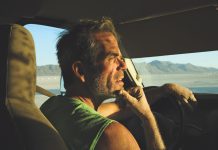Saving Seals by Saving the Sea
Recently my wife and I attended a fundraiser for Laguna Beach’s Pacific Marine Mammal Center. The event featured a showing of the MacGillivray Freeman film “Coral Reef Adventure,” followed by local resident and film director Greg MacGillivray fielding of questions from the audience. The film brimmed with footage of vibrantly colorful, healthy reefs and the marine ecosystems they supported, contrasted with dying reefs suffering from pollution and ocean warming. Only by saving the reefs could the corals and other marine life on which humans depend be rescued. The implications of both the film and the work of the PMMC seemed evident: to save seals we must save their marine habitat.

After the viewing, Greg gave the audience a peek into his company’s projected global initiative called One World Ocean. MacGillivray Freeman Films aims to launch the $45 million social action campaign in 2015 with the release of a 3D IMAX film, a 3D theatrical documentary, and a 3D television series.
At the close of the evening, one of the high school-aged audience members asked Greg if he envisioned a program of NASA-scale proportions to explore and preserve the world’s marine life. The director smiled and said words to the effect that he would be most eager to have a NASA-sized budget available to carry out the task. An attentive young woman asked why the film just seen made no mention of acidification’s deadly impact on reefs. Greg commended her, saying that when the documentary was made in 2003 scientists had not understood the process where ocean-impounded carbon dioxide (caused by the burning of carbon-based fuels) raises sea acid to levels corrosive to reefs. He urged young people to consider entering the field of oceanography to unravel further the interdependencies among life forms on land and sea.
Such a bold endeavor as the One World Ocean project evokes the memory of some historical precedents going back to Congress’s underwriting of Navy Lt. Charles Wilkes’ reconnaissance of the Pacific and circumnavigation of the globe in 1838-1842. This U.S. scientific expedition arguably constituted the greatest maritime exploration in world history, surpassing even the voyages of Britain’s Capt. James Cook. In addition to surveying 1,500 miles of Antarctica’s frigid coastline in vessels at times caked with ice, Wilkes’ expedition brought back shells, coral samples, and specimens of sea life that led to the founding of the Smithsonian Institution.
Referencing Wilkes more than a century later, marine biologist Rachel Carson alerted Americans in 1962 to the dangers that pesticides, like DDT, posed to our ocean-feeding waterways, while writing the most lyrical prose of her time about our connection to the sea. Carson’s writings led to America’s ban of DDT use. In 1970 President Richard Nixon established the National Oceanographic and Atmospheric Administration (NOAA) to explore and protect the watery expanse covering 70 percent of the earth. Unfortunately, NOAA funding falls far below that of NASA. For example, in fiscal year 2010 NOAA was budgeted for $4.6 billion and NASA for $18.2 billion.
Because ocean health is vital to marine life, it is vital to our maritime economy. Take the fishing industry, for example. The international trade in coastal and marine fisheries contributes $70 billion annually to our nation’s economy. When the recent Gulf oil spill occurred, the fishing economy of the region suffered a major set back.
Locally, the work of the PMMC, the Laguna Bluebelt Coalition’s successful drive to extend Marine Life Protection Act safeguards to our city’s coastline, and MacGillivray Freeman Film’s One World Ocean initiative are all signs of a reawakening of earlier American interest in ocean science, an interest shared increasingly by other nations. The findings of that science are clear: saving Laguna’s seals requires saving the sea world of which they, and we, are a part.
Tom Osborne, author of two book,s with a third under contract, is a retired Santa Ana College history professor and a recent recipient of the city’s Environmental Award.





[…] This post was mentioned on Twitter by GreenEddie23g, Laguna Beach Dude. Laguna Beach Dude said: Green Light – Laguna Beach Independent: Green LightLaguna Beach IndependentRecently my wife and I attended a fun… http://bit.ly/etGZQg […]